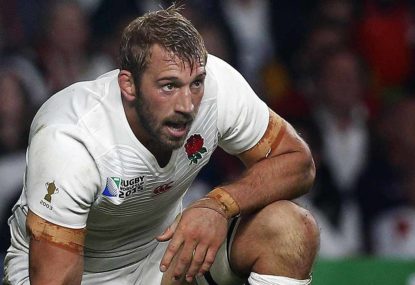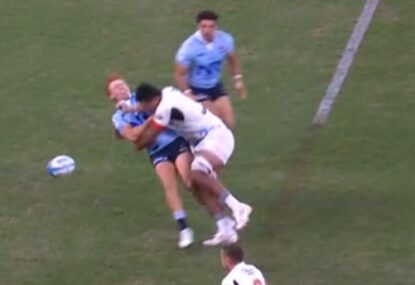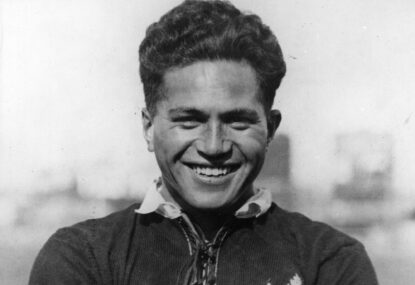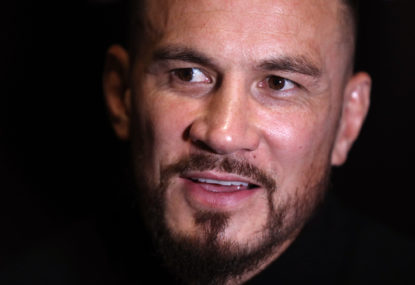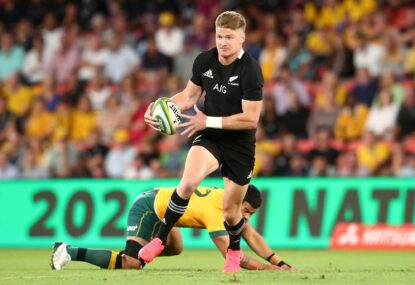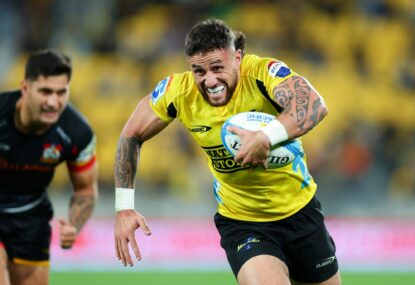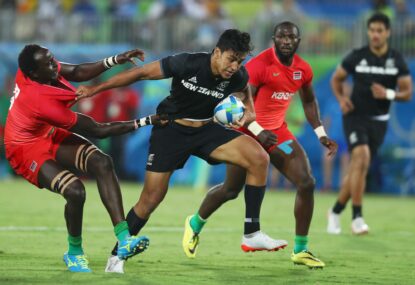Here is part two of the series assessing the weekend’s international rugby Tests.
Click here for part one.
South Africa versus Ireland
After the utter dross dished out by the Springboks in Cape Town, this Test match was do-or-die for Allister Coetzee and his charges. He had only made two changes to his starting line-up for the match, and one of them was injury-enforced with Elton Jantjies brought on for the concussed Pat Lambie.
However, big changes were made to the subs bench, with Lions Ruan Combrinck and Franco Mostert given their first Springbok caps.
And ultimately it was the subs bench that bailed Coetzee out after an utterly tepid first 60 minutes or so in which the Springboks showed that they had learnt no lessons from the first Test. 19-3 down at the break, at one moment it really looked as if Ireland would run away with the game, such was their complete dominance and control over the match.
The Springboks showed no bite when it came to attack, and committed far too many errors and gave too many penalties away. Irish fly-half Paddy Jackson feasted on the Bok infringements and had 14 points to his name by the break.
But then on came the subs – including debutant Ruan Combrinck, and all of a sudden the Springbok attack was energised. Willie Le Roux, who up until that point had simply crabbed his way towards the touchline and not troubled the Irish defence at all, suddenly found a gap through two Irish front rowers, and teed up Combrinck who used Paddy Jackson as a speedbump to barge his way over the line.
Just how none of the Springboks managed to do this to Jackson over in Cape Town remains a mystery, as last week it seemed the little Ulsterman could scramble to tackle just about anything that moved.
However, the drama was not over yet, as straight from the next kickoff Ireland found their way back into the South African 22 and Jamie Heaslip broke away from a maul to score in the corner. Jackson converted and the Combrinck try had been nullified.
That was when the Springboks seemed to have a switch flicked on inside them. Within three minutes, they were back in the Irish 22, and Warren Whiteley stepped inside a tiring Irish cover defence to make it 15-26.
Now they had the wind in their sails, and in the rarefied air Ireland faded away, falling off tackles and ceding easy metres. Franco Mostert piggybacked on Pieter-Steph Du Toit to shove the latter over the line, and then the much-maligned Damian De Allende broke through the tackle of Andrew Trimble and Connor Murray to seal the win.
De Allende is an interesting player. He bears a striking resemblance to a Bollywood actor we have over here named Arjun Kapoor, who in my opinion doesn’t really have great acting skills, but does have what seems to be necessary to be a Bollywood actor these days – a set of abs. More brawn than brain, if you may.
De Allende reminds me of the same. He has a pretty good step, and is quite a handful to tackle, but are these qualities enough for an inside centre today? Whatever may be the case, when you use him to his strengths, namely running hard and fast at a tiring defence, he is devastating.
It’s hard to really nab what flicked that switch in the Boks at Ellis Park. Was it the presence of the Lions in the team? Was it the booing of the crowd at halftime? Was it actually just the altitude having an effect on the Irish more than anything else? Whatever it was, Coetzee will be hoping the first 140 minutes of his reign are well and truly buried now.
Important moments
It’s a recurring theme in this year’s June Tests, the final play before half-time being important in the final outcome of the match. And it was no different here.
In the first 40, the Springboks were playing like a team possessed – but not in the good sense. The amount of panic in their play was astounding, and the try to Devin Toner was just symbolic of how Ireland had thrown a cat among the pigeons.
Jackson’s kicking game was on song, whether out of hand or from the tee, in sharp contrast to his opposite number Elton Jantjies (who was just about the only Lions representative who did not impress). So when the Springboks killed the ball around the 40 metre mark, 15 metres in from touch, the score was expected to become 22-3.
But it seems most Irishmen spoke too soon, and I think the angle of the kick had a lot to do with this, and the kick went agonisingly wide of the left upright. The score remained 19-3. Now, there’s no doubting that the way the match was going, even a 9-3 scoreline seemed enough to put the Boks to the sword, but there is a clear psychological burden on a team when it finds itself down by almost 20 points.
When your score has a 0 in the 10s column, and the opposition has a two it’s hard not to let it subliminally affect you. As it happened, Jackson missed another kick early on in the second half, and what was the final margin between the two sides? six points.
Another important moment was Warren Whiteley’s try. More than anything else the timing of the score was crucial here. Combrinck’s try on 55 minutes had given the Boks a lifeline, but that seemed to be snatched away by Jamie Heaslip’s score.
However, the Springboks were unfazed, and it was inside two minutes that they were back in the Irish 22. First an inside ball from Jantjies to JP Pietersen saw him edge towards the five metre line.
Then Du Toit carried and took out two of Ireland’s best tacklers in Jackson and Heaslip. De Allende’s cleanout was also crucial, as he took Jackson completely out of the tackle area, and prevented him from taking part in the next play.
This, coupled with Connor Murray attempting to tackle Faf De Klerk as the scrum half passed the ball, created a hole into which Whiteley expertly stepped in, and stretched out to score. It was a sign of fatigue from Ireland, and the Boks never looked back.
Looking forward
As I mentioned in Part One, two of the series have now been decided, with the only thing left to play for being Aussie and Welsh pride over on either sides of the Tasman. But the one series that is alive is the one in the Republic. And let’s preview that first.
From an Irish perspective, Joe Schmidt will be more than a bit disappointed with the result over the weekend. Wrapping it up before the third Test would have been ideal for his team, but now they have to pick their bruised selves up to go once more against a Bok team that would be charged up after the final 20 minutes on Saturday (or at least that’s what South African fans will be hoping).
His team played quite well in the first half, but then really wilted badly when the going got tough, and Schmidt will have no doubt noticed that. He admitted as much that it will be tough to dust this result off, although that may be a bit of a bluff.
It was clear that by the end of the game, players like Jackson, Murray, Trimble and Heaslip were running on empty, which makes it odd why he refused to substitute them.
Plus, Robbie Henshaw sustained an injury towards the end of the match, which may rule him out of the Port Elizabeth Test.
Jared Payne may slot into the centres, and Luke Marshall, who was so impressive in Cape Town, is likely to reclaim the 12 jersey. Tadhg Furlong had the upper hand at scrum time, while Rhys Ruddock did a pretty great job in the absence of Jordy Murphy.
The interesting selection from last week that did not really pay off was moving Iain Henderson to 6. Schmidt has a dilemma on his hands, as Devin Toner has been fantastic so far, and the calls for Ultan Dillane’s starting seem to be growing by the minute.
Three do not fit into two obviously, so the toss-up is between Henderson and Dillane. I suspect he will stick with Henderson, but could bring Dillane on earlier than usual. Whether that is for Henderson or if he shifts him to the back row again remains to be seen.
Perhaps Schmidt was keeping all his eggs in the Port Elizabeth basket all along, but that plan is in danger of backfiring, as pointed out by Neil Francis in the Independent : “Maybe Schmidt is holding all his aces for Port Elizabeth. This game, though, will be a far more difficult proposition as the Boks got traction, momentum and some of their confidence back. When the game is there to be won – win it.”
As far as the Boks are concerned – it’s a question of which team turns up, the one that played in the first 140 minutes of the series, or the barnstorming one of the final 20. That aside, however, South Africa still seem to be lacking tactically when it comes to one-upping Joe Schmidt.
Elton Jantjies had a poor game on Saturday, and at one moment I was wondering why they hadn’t kept Morne Steyn on the pitch. Steyn’s goalkicking will surely come into the picture if Jantjies falters with the tee, and the game is a tight one.
Ruan Combrinck, Warren Whiteley and Franco Mostert impressed mightily off the bench, while Julian Redelinghuys has also been clamouring for a start. Allister Coetzee has indicated that Steven Kitshoff could get a debut this weekend.
A Roarer had suggested to me that these players may not start due to the quota system, but I believe that the quota extends to the 23 man squad, and not just the starting line-up. In any case, it’s a dilemma that Coetzee has to solve.
Just how the Springboks will fare depends on the performances of a few players. Jantjies as I mentioned before, along with his halves partner Faf De Klerk, who had a much improved game on Saturday, will be crucial as far supplying the backline with front foot ball is considered.
In the backline, Willie Le Roux, who finally came into his own in the second stanza, will need to rediscover his form, or may risk even losing his place to Combrinck. For Port Elizabeth I still think he will start, but he is a marked man.
Let’s shift attention to the All Blacks and Wales now, since this series is done and dusted. The All Blacks will probably win again (ok they will definitely win again) but whether Wales will put in another gallant showing like in the first two Tests, or wilt like Ireland and England did in 2012 and 2014 respectively, will really be a test of their character.
Liam Williams’ fitness will be sweated over, while addressing their lineout, which was put under immense pressure by Kieran Read and Sam Whitelock throughout the match this weekend will be a prime concern.
As for the All Blacks, Steve Hansen will be hoping that the defensive frailties and inaccuracies showed in the first halves of both Tests will be addressed. The midfield combination of Ryan Crotty and Malakai Fekitoa was disrupted by Fekitoa’s injury on Saturday, and while Seta Tamanivalu is a good option (despite being sent all the way back to Hamilton by Jonathan Davies’ fend), he still needs more experience.
Crotty himself has been more low key than anything else – that one hilarious cross kick aside – but Hansen will give him another chance to impress. Another one who may get a start is Patrick Tuipulotu, but exactly who will be dropped is hard to tell. Ditto with Ardie Savea, but over here the replacement is pretty clear and obvious – Sam Cane will be dropped.
But the elephant in the room is the fly half berth. Aaron Cruden’s injury seemed serious at first, but Steve Hansen allayed those fears and has given him the all clear. Will that be enough for him to start? I’m not sure. Beauden Barrett’s performance at ten in the second half would have just strengthened his claim to a starting spot, and Lima Sopoaga will be more than a bit miffed if Cruden gets the start again. It really is an embarrassment of riches.
Coming to the Wallabies versus England, there are only two words that are on the minds of all parties involved – Three Nil.
There can be no doubt, the English will start the Sydney Test as favourites, and the one weakness they showed in the first Test, the defence, was so emphatically put to bed, the Wallabies will honestly be wondering what they have to do to salvage their pride.
To be fair, they don’t really need to make any wholesale changes. Firstly, they need to get Eddie Jones and all his talk out of their heads. Just focus on playing rugby – as they say, actions speak louder than words.
Secondly, they need to make better decisions – whether that is in general play, or the decision to kick for goal from a penalty. The halves had a poor game last week, with Bernard Foley not really recovering from his missed touch in the first minute, and Nick Phipps just being a fraction of a second too slow in clearing the ball from the base of the ruck.
So far, Ben Youngs, George Ford and Owen Farrell have completely outplayed their counterparts, and this is one area of concern for Michael Cheika.
Lastly, and this problem will be rectified if they take care of the mental side of things, the Wallabies just need to improve their discipline.
You just cannot win a Test match by conceding the amount of penalties they have conceded in the first two matches, and with a goal kicker like Owen Farrell at England’s disposal, silly penalties like obstructions and foul play can be deadly.
Yes, the scrum is another problem area, with Dan Cole having the upper hand over both Scott Sio and James Slipper in the opening Tests, and Mario Ledesma will no doubt need to have a long talk with whoever they decide to go with in the front row.
As regards England, really, what more is left to be said? Best not to change a winning formula, right? They have been clearly superior to Australia in nearly all facets of the game, and rightfully are 2-0 up in the series.
Eddie Jones will hope his troops stay motivated for the final Test, which I think will not be much of an issue, it is clear everyone wants that whitewash quite badly. While the English defence was certainly praiseworthy, Jones will still not want the English to be defending so much.
James Haskell has probably been the man of the series for England, and Chris Robshaw rightfully won the man of the match award in his 50th Test. Maro Itoje was wonderful again in the second row, while the Wallabies targeted George Kruis at the lineout and from restarts.
Along with that, Alex Goode should be given a chance to lay claim to the fullback role in the long term, while Henry Slade and Elliott Daly will be wildcards for a place in the 23.
All in all, just the shade of green remains to be decided in the Republic. As for everything else, it’s All Black and white.






























































































